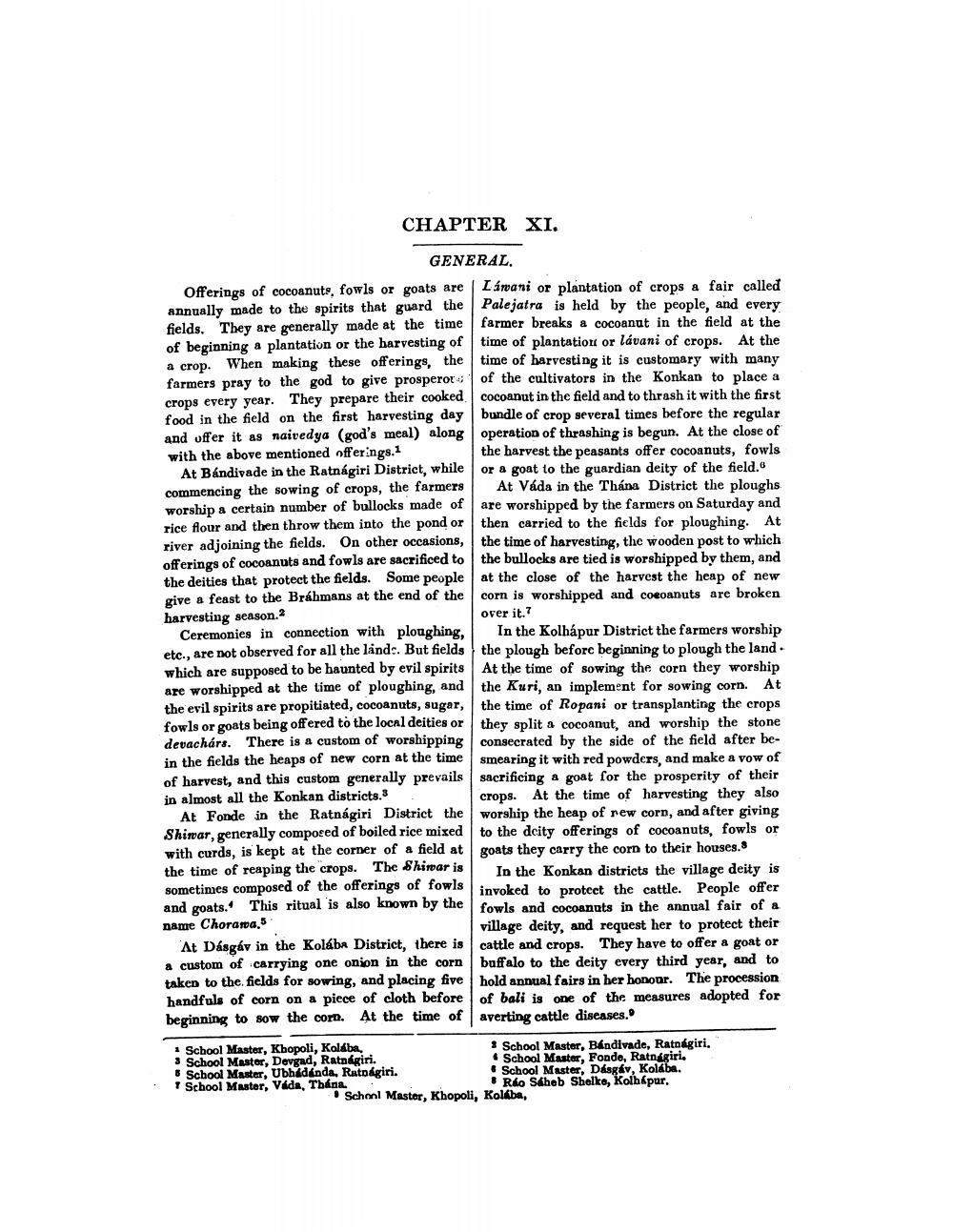________________
CHAPTER XI.
GENERAL Offerings of cocoanuts, fowls or goats are Láwani or plantation of crops a fair called annually made to the spirits that guard the Palejatra is held by the people, and every fields. They are generally made at the time farmer breaks a cocoanut in the field at the of beginning a plantation or the harvesting of time of plantation or lávani of crops. At the a crop. When making these offerings, the time of harvesting it is customary with many farmers pray to the god to give prosperor of the cultivators in the Konkan to place a crops every year. They prepare their cooked cocoanut in the field and to thrash it with the first food in the field on the first harvesting day bundle of crop several times before the regular and offer it as naivedya (god's meal) along operation of thrashing is begun. At the close of with the above mentioned offerings.1
the harvest the peasants offer cocoanuts, fowls At Bándivade in the Ratnagiri District, while or a goat to the guardian deity of the field. commencing the sowing of crops, the farmers At Váda in the Thána District the ploughs worship a certain number of bullocks made of are worshipped by the farmers on Saturday and rice flour and then throw them into the pond or then carried to the fields for ploughing. At river adjoining the fields. On other occasions, the time of harvesting, the wooden post to which offerings of cocoanuts and fowls are sacrificed to the bullocks are tied is worshipped by them, and the deities that protect the fields. Some people at the close of the harvest the heap of new give a feast to the Bráhmans at the end of the corn is worshipned and coenannte Are broken harvesting season.
over it.7 Ceremonies in connection with ploughing, in the Kolhápur District the farmers worship etc., are not observed for all the land. But fields the plough before beginning to plough the land. which are supposed to be baunted by evil spirits | At the time of sowing the
At the time of sowing the corn they worship are worshipped at the time of ploughing, and the Kuri, an implement for sowing corn. At the evil spirits are propitiated, cocoanuts, sugar, the time of Ropani or transplanting the crops fowls or goats being offered to the local deities or
they split a cocoanut, and worship the stone devachárs. There is a custom of worshipping consecrated by the side of the field after bein the fields the heaps of new corn at the time smearing it with red powders, and make a vow of of harvest, and this custom generally prevails sacrificing a goat for the prosperity of their in almost all the Konkan districts.3 . crops. At the time of harvesting they also
At Fonde in the Ratnagiri District the worship the heap of new corn, and after giving Shimar, generally composed of boiled rice mixed to the deity offerings of cocoanuts, fowls or with curds, is kept at the corner of a field at goats they carry the corn to their houses. the time of reaping the crops. The Shimar is
In the Konkan districts the village deity is sometimes composed of the offerings of fowls
invoked to protect the cattle. People offer and goats. This ritual is also known by the
fowls and cocoanats in the annual fair of a name Chorama,5
village deity, and request her to protect their At Dásgáv in the Kolábr District, there is cattle and crops. They have to offer a goat or a custom of carrying one onion in the corn buffalo to the deity every third year, and to taken to the fields for sowing, and placing five hold annual fairs in her honour. The procession handfuls of corn on a piece of cloth before of bali is one of the measures adopted for beginning to sow the corn. At the time of averting cattle diseases. School Master, Khopoli, Kolába,
: School Master, Bandivade, Ratnagiri, 3 School Master, Devgad, Ratnagiri.
. School Master, Fondo, Ratnagiri. & School Master, Ubhidenda, Rutpágiri.
• School Master, Dásgáv, Kolába. School Master, Veda, Thána.
• Ráo Saheb Shelke, Kolhapur. School Master, Khopoli, Koldba,




